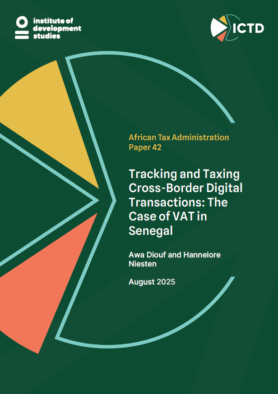African Tax Administration Paper 42
This paper examines the implementation of VAT on cross-border digital transactions in Senegal, with particular focus on transactions involving digital B2C services, within the broader context of taxing the digital economy in Africa. It analyses the extent to which Senegal’s 2024 VAT reform aligns with or diverges from international guidance, while situating it within wider regional developments. As digital platforms reshape global business models, traditional tax frameworks, reliant on physical presence, struggle to address the challenges posed by nonresident digital service providers. Senegal’s 2024 VAT reform extends VAT to cross-border transactions involving intangible digital services supplied by foreign operators. It thus serves as a case study to assess the design, scope and implementation of digital B2C VAT systems in Africa as well as the implications of definitional inconsistencies and fragmented approaches across the continent.
The analysis reveals significant variations across African countries in legal frameworks, compliance measures, and operational strategies when benchmarked against international standards such as the OECD’s 2017 International VAT/GST Guidelines and the 2023 VAT Digital Toolkit for Africa. While countries align closely with global best practices for some components of the reforms, there are several divergences due to economic, infrastructural, and administrative constraints. Common gaps include the lack of simplified compliance regimes, the absence of VAT thresholds for non-resident operators, and invoicing requirements.
Senegal’s reform demonstrates a pragmatic approach, aligning with international standards by introducing simplified registration and invoicing, leveraging digital infrastructure, and avoiding mandatory local representation for foreign operators. However, challenges persist, including enforcement capacity, the administrative burden on small foreign businesses, and limited interoperability with other tax systems. The paper provides actionable recommendations to address these issues, including harmonising VAT regimes across the continent, strengthening digital infrastructure, and fostering international cooperation.
